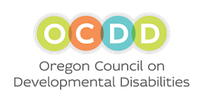
In some moments, I still wonder what it would be like if I hadn’t had all that therapy as a child. Would I still be the same person I am today? NT’s[1] have no clue what it’s like to be followed around and tracked for data all the time. Autistic people, people with behavior disorders, those of us with I/DD[2], anyone with mental illness, and especially those of us who are BIPOC[3] and LGBTQ+[4] feel the weight of that scrutiny, of falling outside the accepted norms, of being deviant and broken, of being always outside the expected. We haven’t often had a chance to offer ourselves up for that scrutiny independently and on our terms.
Let’s assume you are a parent of a young child who is disabled by an inability to speak like my parents were fifteen years ago. They had been encouraged to try a communication method called PECS[5] which is a system of little cards that have pictures on them and the word they represent typed across the bottom. The person in question is taught to find and give their teacher or parent the card that represents the thing or activity they want. Somehow over time the child learns to hand the little card to the authority figure or place it on a velcro strip to request something. My family tried this with enthusiasm for a few months, and then realized it just wasn’t a good fit for us. Instead of going on with it because the experts suggested we do that, my parents simply dropped it and tried other methods as they became available.
 Speech therapy was an absolute waste of time and money, but when the goal is to shed as much of your disability identity as possible, your methods might not be very relevant to your child’s strengths or abilities, which brings me back to the issue of consent and choosing what to pursue when your child’s disability makes life challenging. I say that parents ought to be encouraged to learn from people who grew up with that disability just in the same way they are encouraged to read books and get involved with parents who are also living with that condition or disability in their household. That should be one of the main ways parents find out about therapies that work to empower disabled children instead of inflicting a constant stream of nothing but the message that they are broken. I have shared this before: no child should be receiving forty hours of therapy each week for years like I did. Not only was it unnecessary, but it had the unintended effect of making me question my own decisions which I still do to this day in some instances.
Speech therapy was an absolute waste of time and money, but when the goal is to shed as much of your disability identity as possible, your methods might not be very relevant to your child’s strengths or abilities, which brings me back to the issue of consent and choosing what to pursue when your child’s disability makes life challenging. I say that parents ought to be encouraged to learn from people who grew up with that disability just in the same way they are encouraged to read books and get involved with parents who are also living with that condition or disability in their household. That should be one of the main ways parents find out about therapies that work to empower disabled children instead of inflicting a constant stream of nothing but the message that they are broken. I have shared this before: no child should be receiving forty hours of therapy each week for years like I did. Not only was it unnecessary, but it had the unintended effect of making me question my own decisions which I still do to this day in some instances.
 Sometimes I feel enormous anger over being made to do therapies which I didn’t need or want. So what is a person supposed to do if their loved one was like me and can’t express their consent for whatever therapies they are made to do?
Sometimes I feel enormous anger over being made to do therapies which I didn’t need or want. So what is a person supposed to do if their loved one was like me and can’t express their consent for whatever therapies they are made to do?
If communication is impacted by someone’s disability, the priority should be on finding a reliable method they can use. Maybe it’s something a school staff person suggests, or perhaps your family came up with it. I’d start with consent words like yes, no, not now, later, tomorrow, never, always, together, and so on. If words are too much, then there are recordable buttons someone can program with yes/no that the person with speech challenges can easily tap to respond. That consent can be taught through color with red for no and green for yes, and yellow can represent the mystery of maybe.
I think parents should be encouraged to try all sorts of methods until they hit one that gives their child the power of consent, and then involve that child as much as they can – and want – to be involved in planning their therapy. Maybe it will take thirteen years to find the right one like it took me, or maybe it will come sooner. All I ask is that you never stop trying until your child asks you to.
[1]Neurotypicals
[2]Intellectual and developmental disabilities
[3]Black, Indigenous, and people of color
[4]Lesbian, gay, bisexual, transgender, queer, and others
[5]Picture Exchange Communication System
